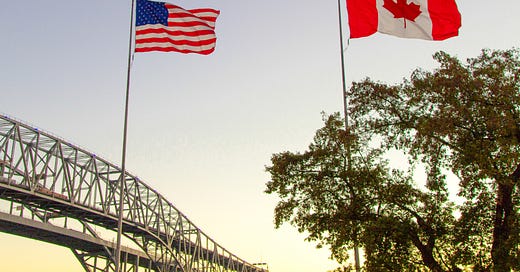Yeah…No. American Befuddlement with Canadian English
What I’ve Learned, and Failed To Learn, After 20+ Years In Canada: A Tale of Borders and Belonging
The first time I apologized to a lady who ran into me, I was in the Community Centre down the block. She nodded and mumbled sorry in return and went on her way. I started laughing and kept laughing for a good 10 minutes. When the boys finished their swimming lessons, I told them I had something important to tell them. “Today,” I said, “I became a Canadian.”
“How so?” my eldest asked, skeptical that his American mother could ever be (truly, authentically) Canadian.
“A lady ran into me and I apologized.”
“Did you apologize first?” my middle son asked.
“I did.”
“Huh,” my eldest said, “that’s a start.”
When we got home I emailed every Canadian living in America that I knew, seeking the validation my kids withheld. The messages trickled in over the next few days.
“Welcome to the club.”
“You’ve been assimilated now.”
“Oh, sorry, I thought you were already Canadian.”
Question from Ask Me Anything: Will I ever fit in as an immigrant?
When I first immigrated, I used to call out my students for apologizing constantly. “You’re here,” I’d tell them. “You deserve to take up space. There’s no need for you to apologize.” Because to an American, not only the word but also the tone Canadians use sounded like an apology for being – as in “I’m so sorry I put myself in your way so you could run into me.” I listened for sarcasm, and didn’t hear it. I didn’t want them to discount their authority through apologizing and ending their sentences in a question (linguistics call it “the Canadian rise”).
But for Canadians, sorry is (usually) neither an apology nor sarcastic. Canadians use the word sorry as social lubricant.
It is meant to diffuse conflict and avoid confrontation. It can mean “I need your attention” or “Excuse me.” And sorry sometimes means “It’s no big deal,”“I don’t mind,” or “I forgive you.” Or even occasionally, “we’re all in this together.”
Sorry is so central to Canadian English and identity that in 2009 the Province of Ontario passed The Apology Act, which clarifies that an apology is not an admission of liability, whatever those American lawyers might think.1
I’ve noticed that when I’m actually apologizing, I say sorry like a Texan (Sahr-ree) and when I’m using it as social lubricant I pronounce it in Canadian English (Sore-ree). So I’ve assimilated, but not as much as I’d like to think.
I wrote a Canadian sorry in an email a few days ago, and the American reading it responded with, “There’s no reason to apologize.”
And that both irritated me and made me laugh. She just doesn’t know what sorry means here. No reason she would.
Canadian English is not American English. It’s a whole other country, after all.
American befuddlement is often about not fully accepting that the upstairs neighbour is not the same as us, and, furthermore, has no wish to be the same.
The other day, I went to Tim Horton’s to write while I was waiting for my eldest to finish an exam, and when I got to the counter, I froze. Usually my kids order for me, and before that, my husband. (My husband was a political refugee from the Republic of Georgia. He knew seven languages and did not find Canadian English a challenge.) I tried to remember my Timmie’s specific vocabulary and then decided to just say what I wanted and assume, like any American would, that they’d understand.
But I wasn’t quick enough.
I’ve been in Timmie’s in Nova Scotia and New Brunswick and PEI where the staff and locals had long, leisurely conversations. But this was outside of Toronto and things move fast. The lady behind me asked what I wanted to order and then translated that into Timmie’s specific Canadian English. I thanked her told her I wasn’t sure what had happened, that I’d been here 20 years.
She patted my arm and said, “That’s ok. Americans always struggle.” Everyone around me nodded. They, or their parents or grandparents, had all adapted and embraced this element of Canadianness. Many of them were adept at code switching.
I had all the privileges of white Americanness and hadn’t figured it out in 20 years. And because of this privilege, no one really expects me to.
Sometimes my anthropologist brain kicks in and I wonder if it’s a whole linguistic system meant to mark boundaries and borders. If you understand it, you belong, and if you don’t, we’ll help you because kindness is a Canadian value, but you’ll remember who you aren’t.
Vocabulary is just a matter of memorization and practice. But phrases can come across as secret codes.
For example, I still find Yeah, no and its variants mystifying. I’d tell you about it, but this viral TikTok explains better than I ever could, and succinctly.
Like the recent visit to Timmie’s, I’m frequently reminded that I still don’t understand Canadian English.
My middle son got a call when I was driving him to his first high school dance.
“Where are you?” his friend asked.
“On my way,” he said.
“Tell your mom to speed or you’ll be locked out!” the boy said.
“Mom,” he said, “you have to get me there before coat check ends at 5:45.”
“Why the rush? You don’t have a coat to check.” It was weirdly warm for winter.
“Mom, ‘coat check ends’ means if you aren’t there by 5:45, they lock the doors and you can’t go inside.”
“Huh,” I said. “Surely that would be a fire hazard.”
“Mom, it’s not literal. They just won’t let you in.”
“Why didn’t they say so?”
“They did say so. What did you think it meant?”
“I thought it meant coat check ends at 5:45. I thought it implied that dinner would be served around 6.”
He sighed in the way only a fourteen year old can, muttered “American” under his breath, and shook his head. “Just get me there on time.”
I did. We arrived at 5:41 because traffic started to clear. We were lucky.
And now I know that “coat check ends” has a different meaning here. And that I’ll never fully adapt, being American. There will always be something that befuddles me. And that my kids are happy to mark the boundaries and borders between Americans and Canadians.
Thank you for joining me today. Hit the heart to let me know that you liked this post.
Would you like me to answer your question in an upcoming post? Post your question on the thread below, or submit anonymously here.
Are you an immigrant, expat, refugee, or student living abroad? Hit reply or leave a comment and share your amusing stories!
Apology Act, 2009, S.O. 2009, c. 3 https://www.ontario.ca/laws/statute/09a03















